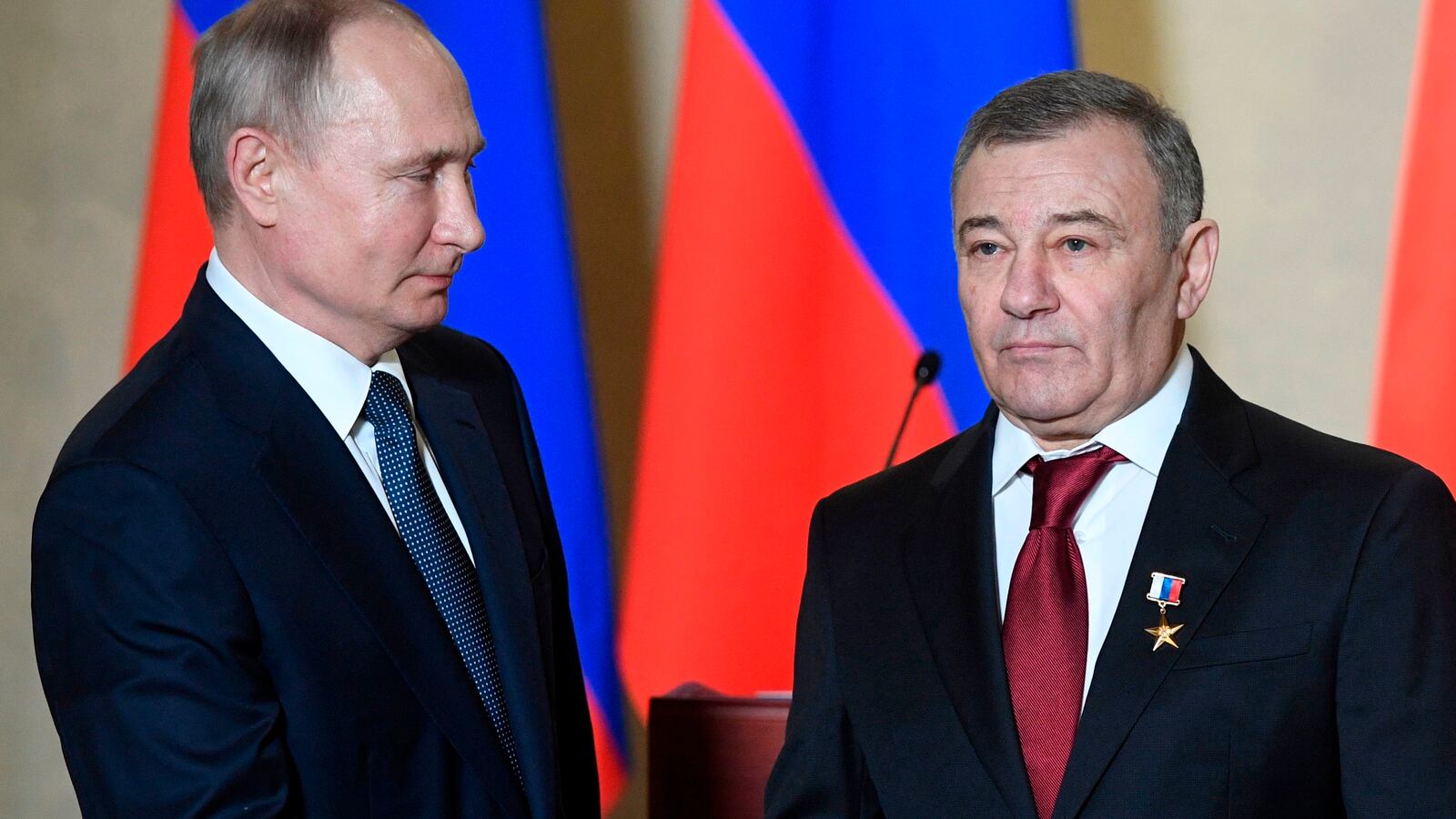Vladimir Putin’s judo sparring partner is fighting his ex-wife in a London courtroom over the ownership of a luxurious British mansion with tennis courts, swimming pool, and a panic room—despite the fact that neither of them is allowed to live in the U.K.
Billionaire Russian oligarch Arkady Rotenberg, 68, a childhood friend of Putin, has been banned from entering the U.K. since 2014, when the EU slapped sanctions on him after his company built a 12-mile bridge between Russia and Crimea, the Ukraine territory that Russia illegally annexed. His former wife, Natalia, 39, an interior designer, no longer lives in Britain because the Home Office refused to renew her visa after 2018.
This has not deterred either of them from choosing British courts in which to argue over the fate of Ribsden Manor, near Bagshot in Surrey, which was bought for $35 million in 2012. Just one year later the couple separated, beginning protracted divorce proceedings.
The litigation remained secret until 2018 when British newspaper The Times overturned privacy orders granting Natalia anonymity.
In 2016, the High Court ordered Arkady, one of the richest men in Russia and estimated to be worth some $2.7 billion, to transfer ownership of the property to his former wife as part of a financial settlement brokered in 2016. The Times has now reported, however, that the issue is back in court owing to the complex offshore structures surrounding the ownership of the house. Arkady’s lawyers argue that the property was not his to transfer. They said that Ribsden Manor was bought in 2012 by a company registered in the British Virgin Islands, owned by an associate and financed with a loan—which appeared, oddly enough, to have come from a company Rotenberg controlled.
A judge ruled last year that the loan was a “red herring” and the “true beneficial owner” of the house was indeed Rotenberg.
In the most recent court hearing, as reported by The Times, it was also revealed that because Natalia Rotenberg was no longer living in Britain there are now doubts about whether U.K. courts even have jurisdiction in the case.
The legal battle with his wife is just one part of Arkady Rotenberg’s complex life.
With his brother Boris, he is co-owner of the Stroygazmontazh Group, the largest construction company for gas pipelines and electrical power supply lines in Russia. The company became embroiled in geopolitical controversy when it built a 12-mile bridge between Crimea and Russia, shortly after the country was illegally annexed by Russia from Ukraine. The Rotenberg brothers were sanctioned and made subject to travel bans because Ukraine did not give its consent to the construction of the bridge.
Arkady Rotenberg has known Putin since childhood, and they have been photographed together doing judo training. Putin personally presented him with Russia’s Medal of Honor for his work on the bridge, a long-dreamed-of project whose completion has been used as a focus for rallying Russian nationalist sentiment by Putin.
He and his brother are among Russia’s richest people, with interests in banking and construction. They even own a slice of Moscow airport.
Rotenberg companies appear to have benefited handsomely from their close relationship with Putin. They reportedly got $7.4 billion in government contracts for the 2014 Olympic Games in Sochi and $5 billion for the 2018 World Cup in addition to the $3.5 billion bridge contract.
The Rotenbergs were reportedly being lined up as investors in the proposed Trump Tower Moscow by middleman Felix Sater.
In 2014, the U.S. Treasury Department sanctioned both brothers, identifying them as members of Putin’s “inner circle.” They were also accused by U.S. authorities of using million-dollar art deals to bypass sanctions. A congressional report claimed that the Rotenbergs spent $18 million buying art in the months after sanctions were imposed in 2014 to get their money out of the U.S. The Senate subcommittee alleged that the billionaire family used a Moscow-based art consultant, Gregory Baltser, to facilitate the art purchases in the U.S. The scheme saw the consultant purchase art for clients, paying auction houses directly through wire transfer and not bidding at auction.
The report stated: “Despite having voluntary [anti money laundering] and sanctions policies, auction houses failed to ask basic questions of Mr. Baltser, including for whom he purchased art. This allowed Mr. Baltser to continue to purchase art despite the imposition of sanctions by the United States on the Rotenbergs, completely undermining any action taken by the auction houses to block transactions by sanctioned individuals.”






